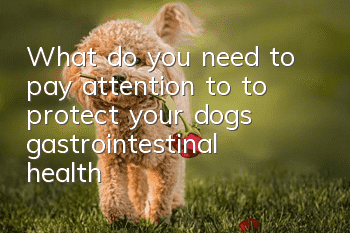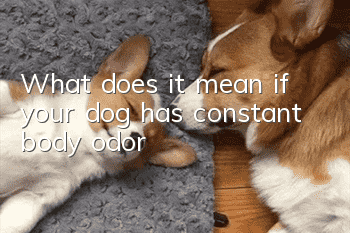What do you need to pay attention to to protect your dog’s gastrointestinal health?

It should be every dog owner’s dream to have a healthy stomach for his dog. After all, the nutrients in food can only help the growth of dogs if they are fully digested and absorbed. Only with a healthy gastrointestinal health can we "be in better shape and eat better." If there is a problem with the dog's gastrointestinal health, it can range from loss of appetite, which affects the dog's nutrient absorption; to vomiting and diarrhea, which can make the dog seriously ill.
In order to protect the gastrointestinal health of dogs, what should we pay attention to when feeding them?
"Don't feed it stale food!" I believe this is the first answer that most poop collectors can think of when faced with this problem.
After all, for us humans, as long as the food we eat is fresh, it generally won’t cause gastrointestinal problems. But just keeping the food fresh is not enough for dogs.
Because the dog’s digestive system is much more fragile than that of humans. In order to take good care of the fragile digestive system of dogs, everyone needs to pay attention to more details in life. Next, I will sort out for you the five major details you need to pay attention to in order to protect your dog’s gastrointestinal health:
1. Clean your dog’s eating utensils promptly
Every time after the dog eats, the poop scoopers must clean the tableware used by the dog in time. Moreover, the tableware needs to be disinfected regularly after being used for a period of time.
If the cleanliness of the tableware is not guaranteed, the remaining food may ferment, decay and breed bacteria, and foreign bacteria may also "take root and sprout" in the tableware used by dogs. In this way, bacteria may be mixed in the food, causing gastrointestinal discomfort and indigestion in dogs. Therefore, the dog owner should keep the dog’s tableware clean at all times.
2. Eat small meals often
Since the capacity of a dog's stomach is limited, feeding too much at one time will suddenly increase the burden on the dog's stomach and easily cause indigestion and vomiting.
Under optimal conditions, adult dogs need to be fed twice a day. Puppies under 5 months old need to be fed three times a day. If you cannot ensure that you feed your dog on time, you must also control the amount each time. You cannot give it all the food for the day at once. It is better to make your dog hungry than to overfeed it.
At the same time, it should also be noted that the food provided to the dog at each meal should be roughly the same. Uneven hunger and fullness, and overeating after one meal will cause serious damage to the dog’s digestive system.
3. The frequency of dog food replacement should be moderate
When changing dog food for dogs, the frequency should be controlled to change dog food every three months to six months. Neither too frequently, and you can’t stop changing dog food all the time.
If you change your dog's dog food every month, or change your dog's dog food every time he eats a pack, it will cause greater irritation to the dog's gastrointestinal tract. Because each type of dog food has different nutritional formulas, textures, and ingredients, dogs need to adjust their digestive habits to adapt to the new dog food every time they change their food.
However, dogs also have diverse needs for different nutrients. One piece of dog food often cannot meet the diverse nutritional needs of dogs. Appropriate replacement of dog food will help meet the diverse nutritional needs of dogs.
In addition, when changing dog food, in order to avoid irritating the dog's gastrointestinal tract, it is necessary to gradually change dog food in a proportional manner.
The first day: 75% old food + 25% new food. If the dog has diarrhea or abnormal stool, reduce the proportion of new dog food.
The fourth day: 50% old food + 50% new food. Similarly, if the dog has diarrhea or abnormal stool, reduce the proportion of new dog food.
Day 7: 25% old food + 75% new food. Similarly, if the dog has symptoms of discomfort, reduce the proportion of new dog food.
Day 10: You can completely feed new food.
4. Mix dry and wet diet.
If your dog is fed only dry food, it may be too dry and hard, causing stress on the dog’s digestion. Especially for dogs with poor gastrointestinal problems, food that is too dry and hard may cause further digestive problems. Therefore, it is recommended that the poop scooper prepare some extra wet food for the dog and mix the dry and wet food when feeding to achieve the best feeding effect.
Wet food is generally rich in water. In addition to softening the food and making it easier to digest, it can also help dogs add extra water every day. At the same time, the nutrients contained in wet food, combined with dry food, can provide dogs with a more comprehensive nutritional supply. To maintain a healthy dog’s gastrointestinal health, the balance of dry and wet conditions is very important…
- How to train a cat to use cat litter? A must-read for cat owners!
- When is the best time to train a Border Collie?
- How to train Dogo for three months
- Should a puppy that rarely goes out need deworming?
- Causes and prevention of gastroenteritis in dogs
- What are the symptoms of calcium deficiency in dogs? You should supplement it with calcium!
- What kind of dog food should Shiba Inu puppies eat?
- Poisoning in dogs usually occurs within a few hours
- The 4 major shortcomings of British Bulldogs: they are prone to illness and disobedience!
- How many days will it take for the puppy to eat on its own?



